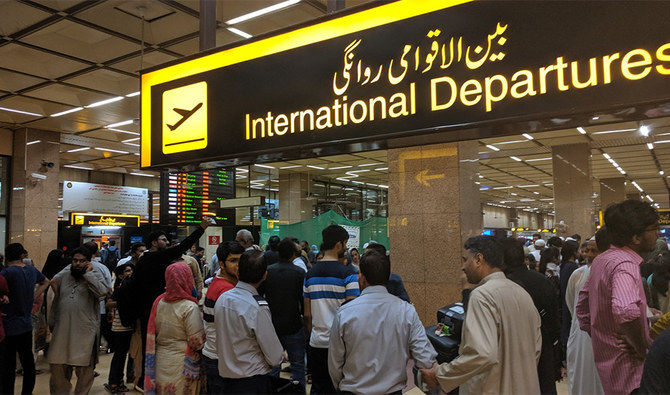KARACHI: Pakistan will launch its month-long Hajj flight operation from today, Thursday, with 11 flights scheduled to arrive in Madinah from five major Pakistani cities, including Karachi where passengers will utilize the Makkah Route Initiative for the first time.
Pakistani officials last month confirmed Saudi Arabia’s decision to expand the Makkah Route Initiative, previously available in Islamabad, to the airport in Karachi, the country’s largest and most populous city.
Launched in 2019, the Makkah Route Initiative allows for the completion of immigration procedures at the pilgrims’ country of departure, making it possible to bypass long immigration and customs checks on reaching Saudi Arabia. The facility significantly reduces waiting times and makes the entry process smoother and faster.
“These flights will transport pilgrims from Islamabad, Karachi, Lahore, Multan, and Peshawar to the Prince Mohammad Bin Abdulaziz International Airport (Madinah Airport), beginning a massive influx of devotees from Pakistan and other parts of the world,” state news agency APP said, adding that the first 11 flights would take 2,160 Hajj pilgrims to Madinah.
The agency reported that Nawaf bin Said Al-Malki, Saudi Arabia’s ambassador to Pakistan, would visit the Islamabad and Karachi airports, both now operated under the Makkah Route Initiative, to bid farewell to Pakistani Hajj pilgrims.
“The pilgrims will be received by authorities concerned at the Pakistan Consulate General and the Hajj Mission of the Ministry of Religious Affairs,” APP added.
Under the Hajj flight operation, five airlines – Pakistan International Airlines, Saudi Airlines, Airblue, Serene Air, and Air Sial – will operate 259 sorties to transport around 68,000 intending pilgrims from eight major cities of Pakistan, namely Islamabad, Karachi, Lahore, Peshawar, Multan, Quetta, Sialkot, and Sukkur, to Jeddah and Madinah under the government scheme.
According to the flight schedule, the first flight, PF754 (AirSial), is scheduled to depart for Madinah at 01:45 am from Karachi, carrying around 150 intending Hajj pilgrims. The last Hajj flight, SV3727 (Saudi Airlines), will depart on June 10 from Islamabad to Jeddah, with 380 passengers onboard.
During the first 15 days, all flights will operate from various cities of Pakistan to Madinah until May 23, and afterwards, they will land at the King Abdulaziz International Airport, Jeddah, until the completion of the Hajj flight operation.
This year, around 179,210 Pakistanis will perform Hajj under both the government and private schemes, for which a month-long flight operation is scheduled to commence on May 9, tomorrow.
Out of 179,210 pilgrims, 89,605 each will embark on the holy journey under the government and private schemes, while a quota of 25,000 and 44,802 pilgrims, respectively, have been allocated to the sponsorship schemes.
















